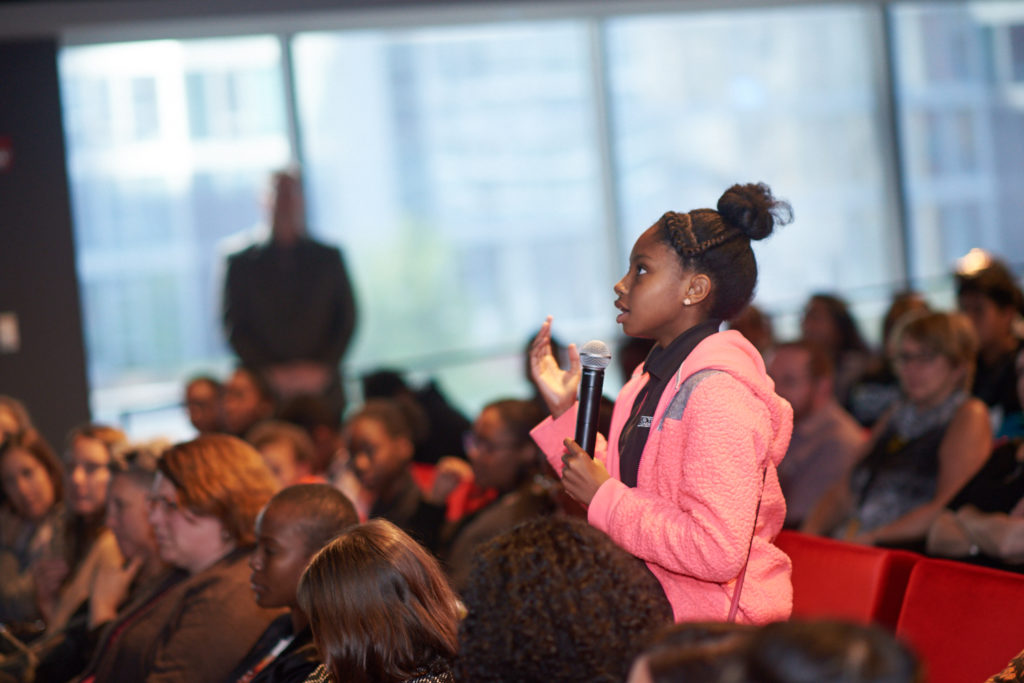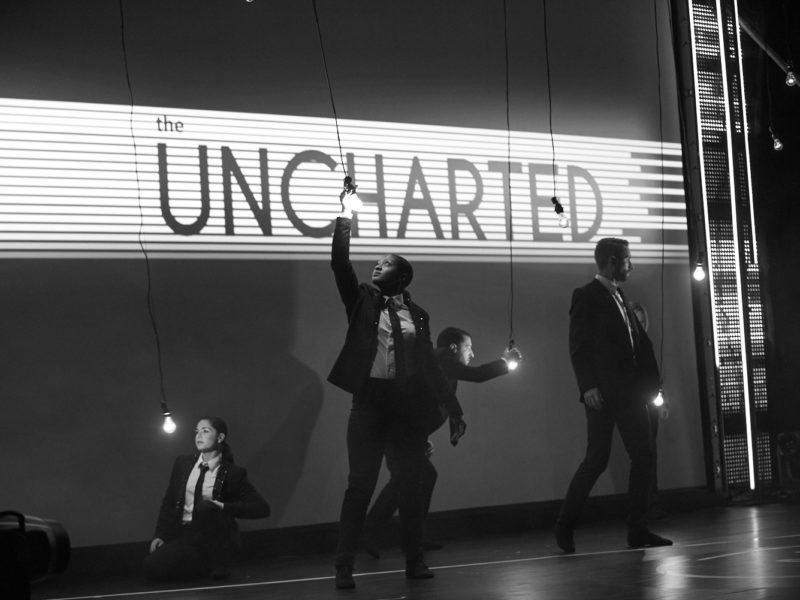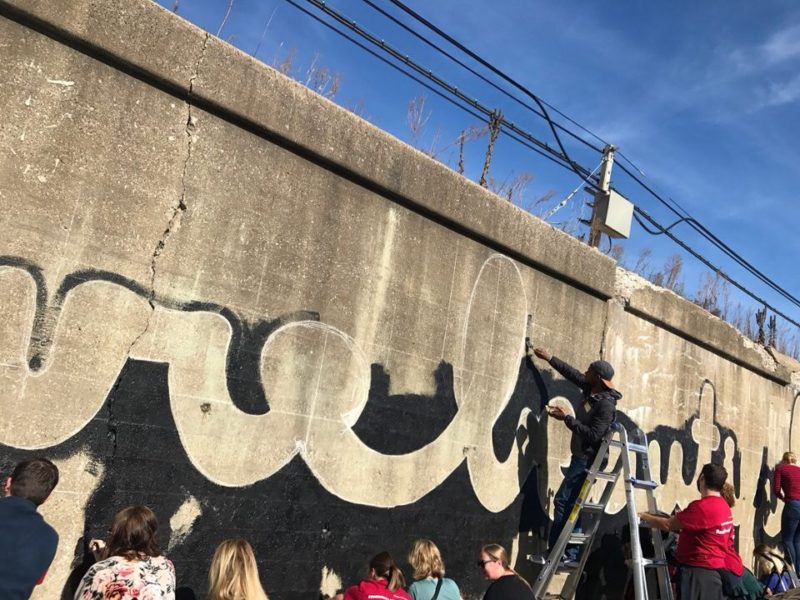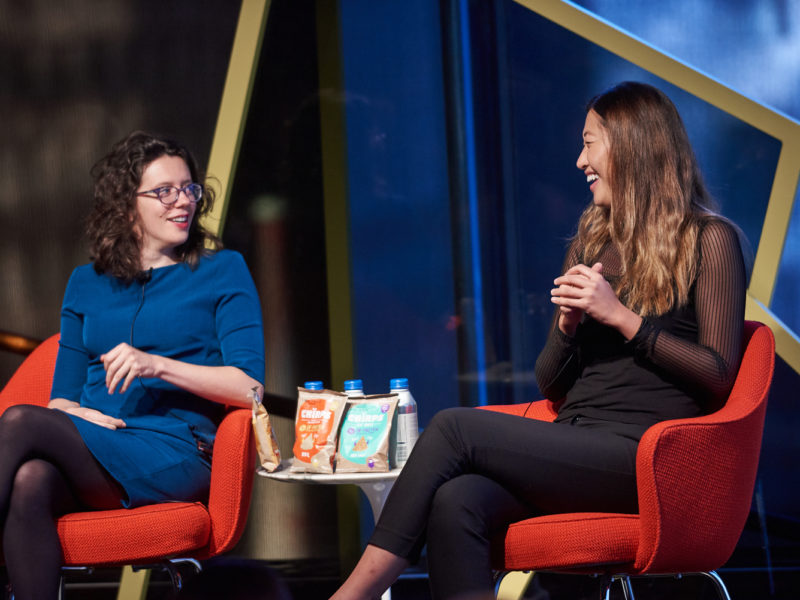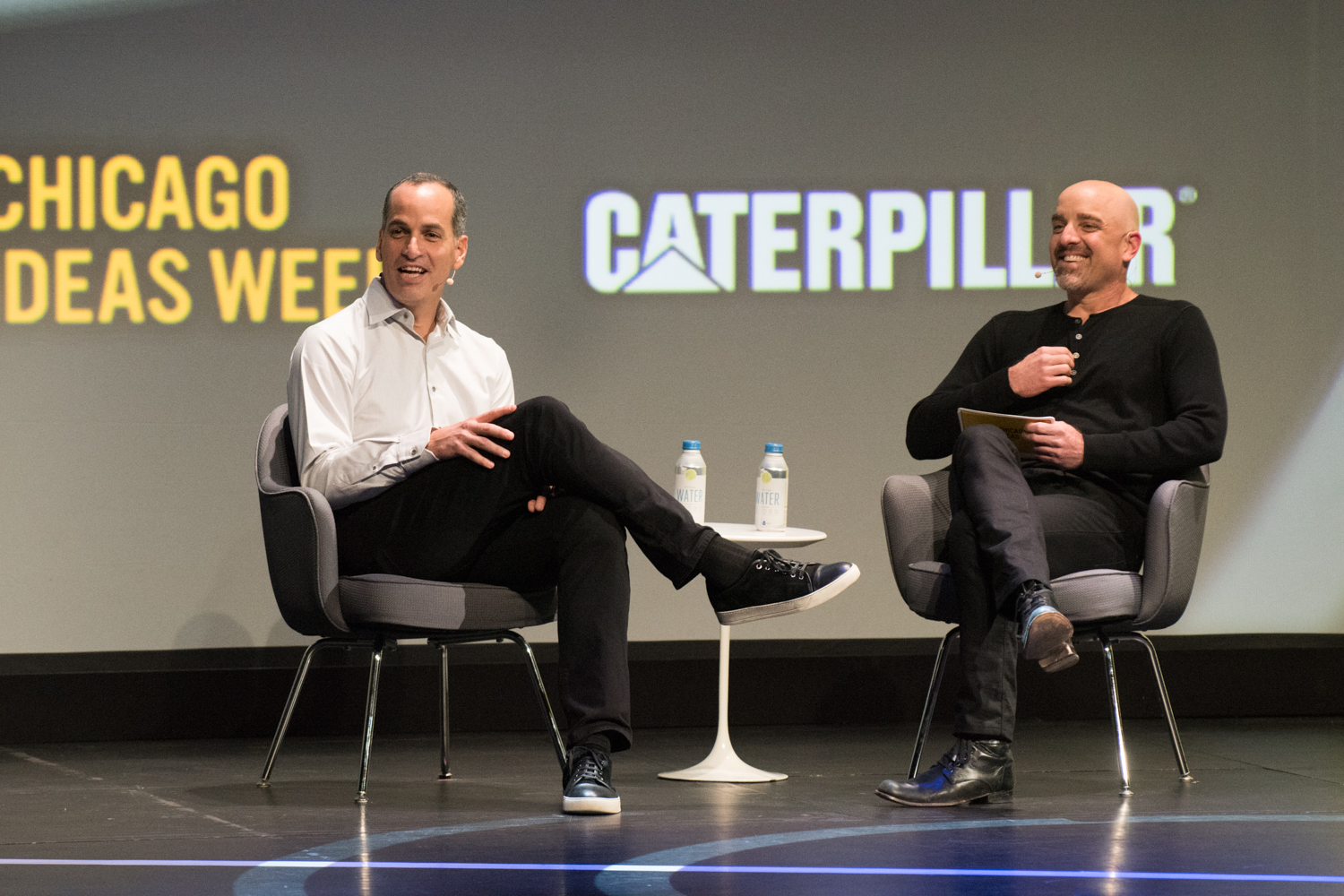
5 Ways to Make a Difference from Chicago Ideas Day Three
Think about having 90 seconds where you’re 100 percent certain you’re going to die. That scenario happened in real life to Ric Elias of Red Ventures, who crash landed with the rest of US Airways Flight 1549 on the Hudson River. At last night’s Life’s Big Questions Talk, Elias shared with Chicago Ideas Founder Brad Keywell that from that moment on, he asked himself what he was going to do with the luck he was given. If you were given a second chance at life, what would you do to make a difference? Day 3 of Chicago Ideas Week offered some solid, actionable ways to jumpstart your ability to affect change in your community.
Deepen Your Connection to People from Different Backgrounds
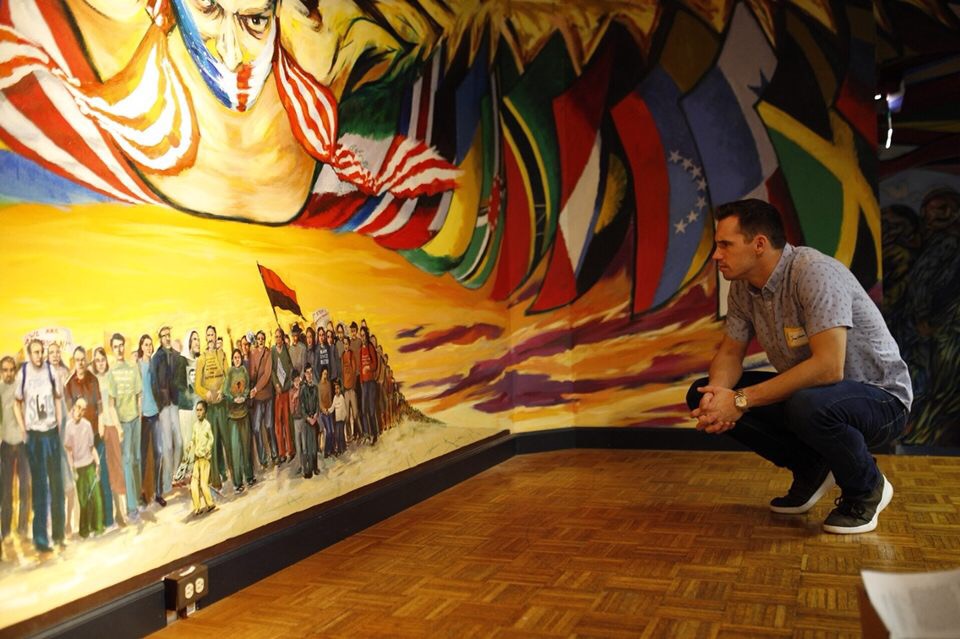
Participants at the Immigration Dialogue Lab experienced a deeper connection to the issue by experiencing it through art.
Coming together with people from different racial, ethnic and socioeconomic backgrounds is key for being able to understand issues in an intersectional way. “Ignorance is just a lack of knowledge. And the more we understand about people around us the less mistakes we’ll make as human beings,” Sharyn Culbertson from Catharsis Productions told participants of our Lab on fighting microaggressions. Over at our Immigration Dialogue through Mural Art Lab, the Chicago Ideas community explored the largest indoor mural in Chicago, at the UIC Latino Cultural Center. “Art can have many different interpretations to people,” said Lena Guerrero Reynolds. “Through art we can understand some larger social issues that can’t be articulated with words.” There are lots of different ways to meet people from different backgrounds than yourself, but finding common interests is a good way to start. Volunteer for a cause—like the participants of our Cradles to Crayons Lab, who packed winter coats and other clothing to be delivered to children, along with personal notes of encouragement. Or how about nature? At the Lab over at UIC Heritage Gardens, young gardeners Nour Ghalyoun and Britany Davis explained that the monarch butterfly symbolizes immigration with its ability to cross manmade borders.
Get Better at Effectively Sharing Differing Viewpoints
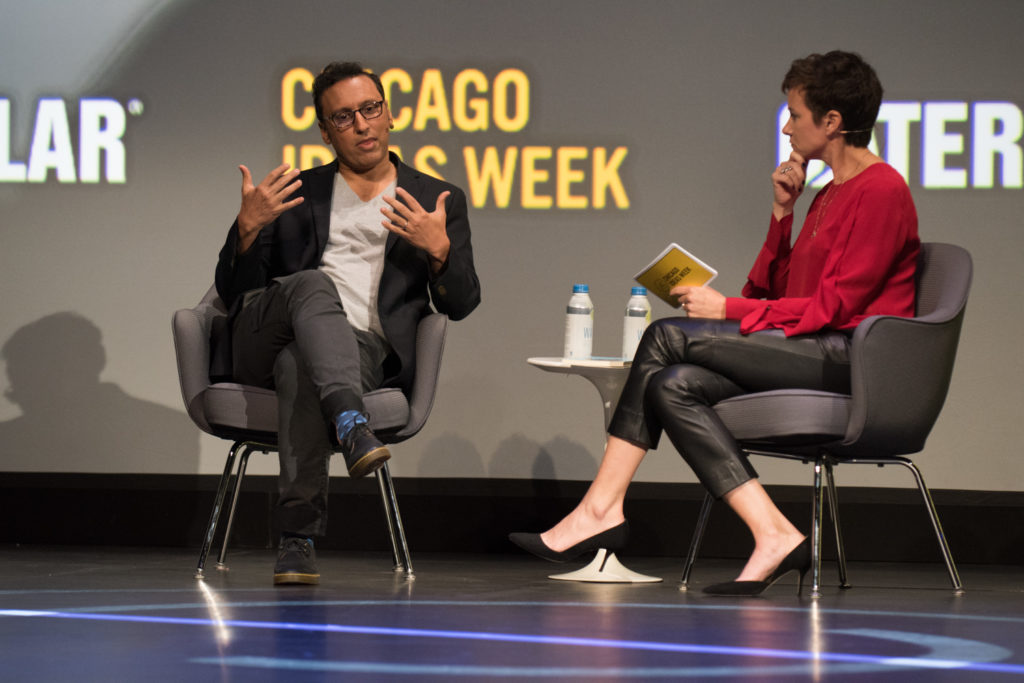
Aasif Mandvi tells Life’s Big Questions host Stephanie Gosk about lessons he’s learned, some of which were at Chicago Ideas Week!
“Fear is the gift that keeps on giving,” former Daily Show correspondent Aasif Mandvi told the crowd at last night’s Life’s Big Questions Talk. “It’s almost like we collectively decide what we’re going to be afraid of, even if the facts don’t show it.” So how do you convince someone who fears a certain group of people that they’re wrong? Mandvi takes a cue from Tuesday’s Breakthroughs Talk, where he learned that making a personal connection first is the best way to change someone’s point of view. Feeling that people wouldn’t be scared of Muslims if they knew more of them, Mandvi said he’s striving to become “America’s Muslim friend.” At our Conversation “Against All Odds: The Fight for a Black Middle Class,” panelists agreed that for African Americans, trying to change minds simply by showing the goodness of black people might be a strategy that has reached the limits of its efficacy. Instead, arguments about the impact of racism need to eschew moralizing and focus on the devastating economic consequences for Americans of all races.
Bridge the Gap Between Ideals and Action
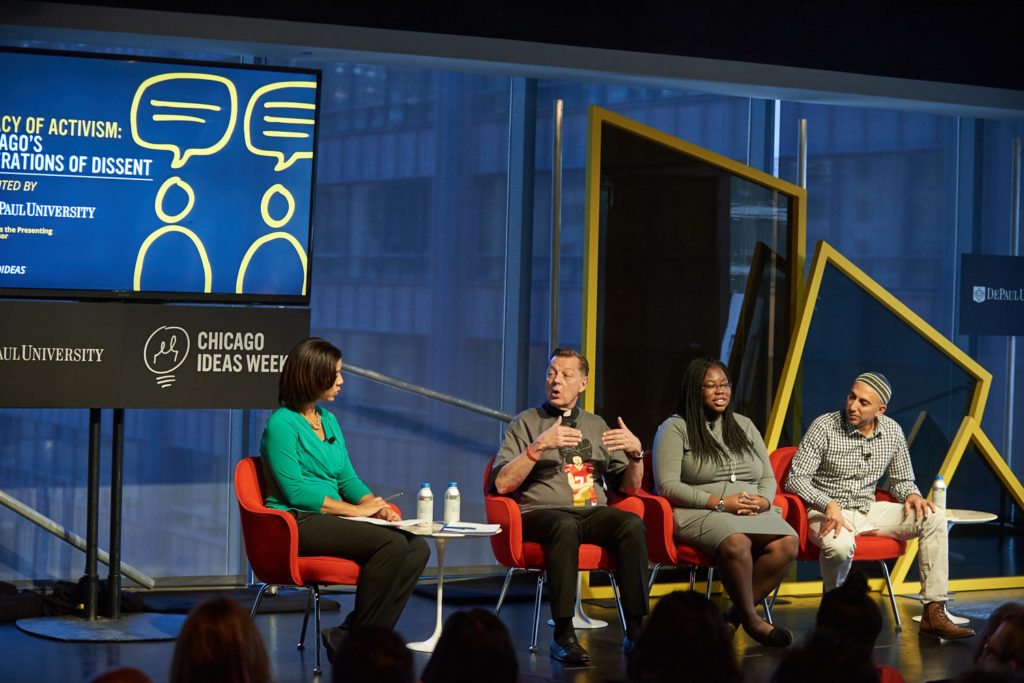
Father Michael Pfleger, who was wearing a T-shirt featuring Colin Kapernick with his clerical collar, urged people to get involved with organizations that have clear-cut goals and concrete ideas to achieve them.
“Liked” your friend’s political rant on Facebook and went back to watching TV? Father Michael Pfleger is not impressed. At our “Legacy of Activism” panel, Pfleger said movements “can’t be allowed to become Facebook reality shows. Behind the protests, there needs to be organizing with goals in mind, because that brings about change.” Or, as Dan Egan put it at yesterday’s fintech panel, “Don’t mistake entertainment for progress.” Instead, Pfleger urged the Chicago Ideas community to not become distracted by the most recent racist or other offensive scandal, and focus on the spirit behind our beliefs in the first place. Otherwise, we’re in a constant process of resetting our outrage, rather than remaining consistently motivated to affect change on one overarching issue. That night at “Life’s Big Questions,” Tiffany Shlain gave audience members a framework for figuring out their purpose: asking yourself, “How can I bring my strengths to the things I care about most?” And an unexpected hint was found at our Mixology Lab at Mike’s Hard Lemonade, which has perfected engaging others. “High-quality creative doesn’t have to be high production value,” Kellye Lopez told participants while they learned to mix drinks. Film a video, write a story, or otherwise let your story be heard. It doesn’t have to look perfect to make an impact.
Take Care of Yourself, But Don’t Give Up
Especially if you’re part of a marginalized community, it can often be hard not to lose hope at the current state of affairs. And for some, the despair goes far beyond being marginalized. At our Legacy of Activism panel, Camiella Williams shared her story of growing up on the South Side in the midst of gun violence. After more than two dozen friends and family were killed by guns, Williams’ “body gave out” and she broke down. “The violence is a symptom of the unmet emotional needs of our children,” Nedra Sims Fears pointed out at the Black Middle Class panel. Surprisingly, music might be able to help. In an enlightening Q&A at Life’s Big Questions, opera singer Renée Fleming explained how music can actually help heal the brain, helping those with PTSD and chronic pain along with a slew of other conditions. With enough self care, Williams was able to get back up to fight another day. “There will be moments that you’re called upon to demonstrate courage in the face of enormous bigotry.” Williams’ co-panelist Rami Nashashibi said. Williams has done just that, and she urged others to stay strong even if the situation seems hopeless. “It doesn’t matter if you feel like you’re standing on your own,” she told a student in the audience. “Keep fighting.”


